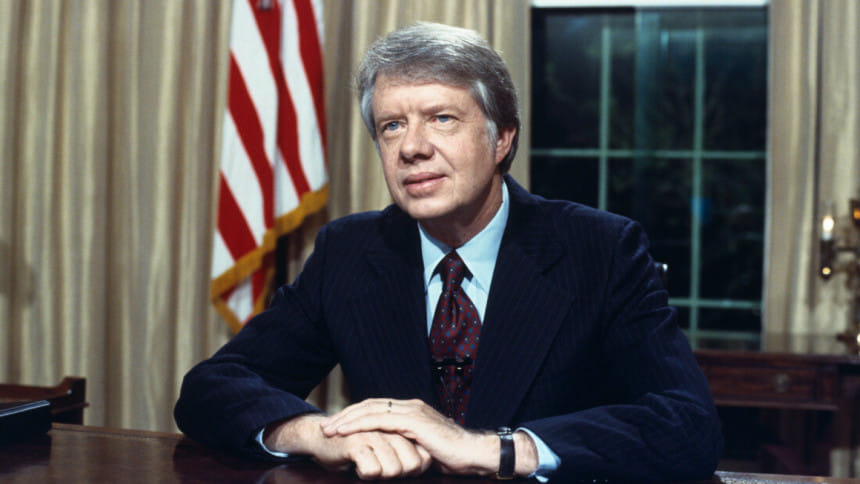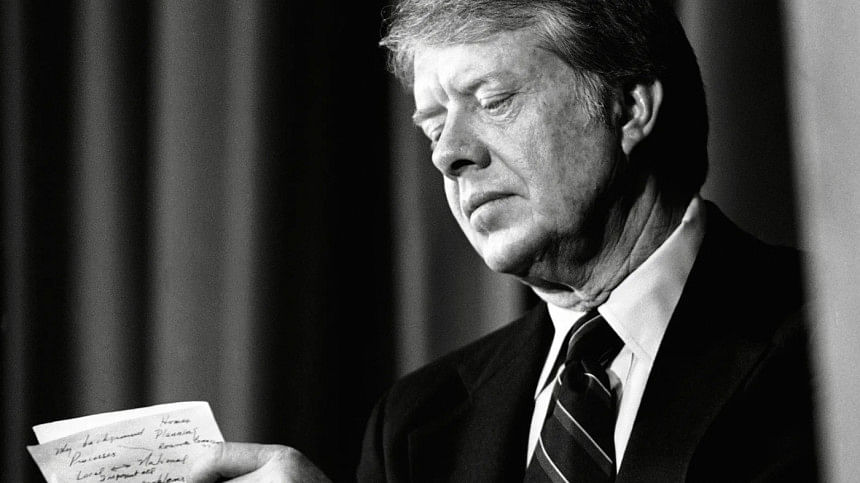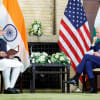Jimmy Carter: The US president who called a spade a spade

About ten years ago, I first came to know that Jimmy Carter used to send handwritten or typed letters to other world leaders by snail mail. He did not use emails for important communication because he was almost certain that even a former US president like him would not be spared from the US government's phone tapping and other forms of intrusive surveillance. That gave me goosebumps and confirmed my misgivings about communication technologies.
In 2014, during an interview on NBC's Meet the Press, Carter said, "As a matter of fact, you know, I have felt that my own communications are probably monitored. And when I want to communicate with a foreign leader privately, I type or write a letter myself, put it in the post office, and mail it."
Thanks to the Edward Snowden affair of 2013, we now know that countries like the US and UK run (electronic) eavesdropping programmes to spy on their citizens as well as foreign nationals and agencies. They do so mainly through collecting telephone records and/or intercepting internet communication tools. Carter sensed it much earlier, as he became cautious and started writing letters and using snail mail years before the Edward Snowden revelations of mass surveillance.
Carter was ahead of his time not only in the field of surveillance and information systems and their implications for our freedom. He was also a remarkably exceptional US president, especially in his efforts to solve the Israel-Palestine conflict. Unlike other US presidents, he was outspoken and forthright on this question and was honest and courageous enough to blame the Israeli government for its atrocities against Palestinians. Thus, he went against the grain of US foreign policy and called Israel what it is—an apartheid state.

In 2006, Carter famously sparked an outcry when his book Palestine: Peace Not Apartheid was published. He raised moral questions about Israel's (mis)treatment of Palestinians. He was the first Western leader to define the Israeli regime as apartheid. In the book, he said, "Utilising their political and military dominance, [Israeli leaders] are imposing a system of partial withdrawal, encapsulation, and apartheid on the Muslim and Christian citizens of the occupied territories" (Pg 189). Through this bestselling book, Carter reached a very wide audience and told the world that Israel was a segregationist apartheid state that dehumanised Palestinians and institutionalised discrimination against them.
In his review of Palestine: Peace Not Apartheid, William B Quandt, professor of government and foreign affairs at the University of Virginia, characterised Carter as someone "who actually cared deeply about Middle East peace, who would not give up in his quest for a settlement, and who was prepared to take political risks for what he believed in."
Among many other scholars who reviewed the book was AJ Abraham, a professor of history at the City University of New York (CUNY). In his appraisal of the book, Abraham said, "I have no doubt about it, whatsoever, that President Carter will be regarded as one of the US's exceptional and most eminent leaders because of his personal dignity, morality, beliefs, and his constant effort to promote human rights in US foreign policy worldwide."
Actually, Carter's distinctiveness is more pronounced in his sharp turn away from the prevailing views of the US establishment about the Israel-Palestine issue. In this, he emerged as "a man guided by firm moral principles" and as "a different kind of president" who "broke taboos" and "ignored powerful lobby groups."
Even though in Palestine: Peace Not Apartheid, Carter "exemplified the issue of Palestinian rights as strongly as he has supported those same rights for the Jewish people," soon after the book was published, a barrage of abusive statements and malicious insults were heaped upon him. On January 15, 2007, the tabloid New York Post published an opinion piece titled "Jimmy for Terror" that spewed vitriol against the book and its author. It posed this rhetorical question about Carter: "How did this man ever become president of the United States?" Finally, the essay made this recommendation to the political party to which he belonged: "It's time for the Democrats to finally cut all their ties to Carter…. If they don't, Americans should consider the implications."
One day after the death of Carter on December 29, 2024, the British newspaper The Guardian published an article titled "Carter's book on Israeli 'apartheid' was called antisemitic—but was it prescient?" It revisits the controversy that had surrounded the publication of Palestine: Peace Not Apartheid. It states that "prominent American supporters of Israel lined up to denounce Carter and the book" for "likening the Israeli occupation of the Palestinian territories to South African apartheid." According to the article, epithets that Carter's detractors hurled at him included "bigot" and "blinded by an anti-Israel animus."
Eventually, the characteristic decency of President Carter defeated the derision and hatred flung at him. He was certainly not wrong in calling Israel an apartheid state and was actually many years ahead of his time in attaching the adjective to the Jewish country. Since the publication of Carter's book, commentators and human rights organisations have routinely used the term "apartheid" to describe Israel's human rights violations against Palestinians.
Given Israel's most egregious records of genocidal crimes against Palestinians, especially since early October 2023, the word "apartheid" is now an understatement and does not capture the full scale of the Zionist state's brutality towards Palestinians. Observers and various human rights groups, including Amnesty International, now routinely use the term (live-streamed) "genocide" to describe the atrocities that Israel has been committing against Palestinians, especially those in Gaza.
When we see the extent of destruction and the suffering of children, men, and women in Gaza, even the term "genocide" sounds inadequate. We look for stronger words to sufficiently explain Israel's extraordinary cruelty and the barefaced immorality of those who supply weapons to the apartheid state and abet its crimes.
Lastly, on January 9, 2025, the National Cathedral in Washington, DC held a state funeral for Jimmy Carter, where Joe Biden delivered a eulogy and praised the late president for his strength of character. Perhaps a man who called Israel an apartheid state deserved a eulogy from a like-minded statesman, not from someone who continued providing Israel with weapons and diplomatic cover to commit one of the worst genocides in human history.
Dr Md Mahmudul Hasan is professor at the Department of English Language and Literature, International Islamic University Malaysia. He can be reached at [email protected].
Views expressed in this article are the authors' own.
Follow The Daily Star Opinion on Facebook for the latest opinions, commentaries, and analyses by experts and professionals. To contribute your article or letter to The Daily Star Opinion, see our submission guidelines.

 For all latest news, follow The Daily Star's Google News channel.
For all latest news, follow The Daily Star's Google News channel. 









Comments